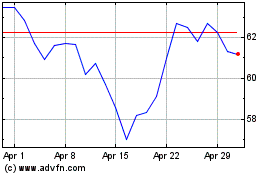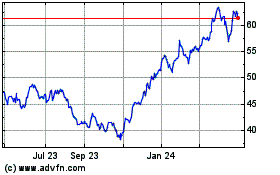WASHINGTON—Fed Chairwoman Janet Yellen faced pointed questions
from lawmakers in both parties Thursday about the Fed's handling of
financial regulation, the latest evidence of the political
minefield the central bank is navigating ahead of some critical
decisions this year.
During a hearing that was nominally about monetary policy,
members of the Senate Banking Committee peppered Ms. Yellen with
questions about the pending decision on big banks' "living wills,"
potential changes to the Fed's annual "stress tests," and the role
of regulation in recent market volatility.
Two liberal Democrats, Sens. Sherrod Brown of Ohio and Elizabeth
Warren of Massachusetts, pressed her on perhaps the toughest
decision facing the Fed at the moment: How will it carry out the
living will process in the 2010 Dodd-Frank financial-overhaul
law?
Dodd-Frank required banks to write plans for managing their own
failure without taxpayer help. Under the law, if the Fed and the
Federal Deposit Insurance Corp. found the plans to be not credible,
the regulators could impose significant sanctions and even force
firms to break into pieces.
In an intriguing exchange with Ms. Warren, Ms. Yellen raised the
possibility that regulators will publicly release their criticisms
of individual bank's living wills. That could put a harsher
spotlight on banks whose bankruptcy plans fall short.
In August 2014, months after another hearing in which Ms. Warren
pressed Ms. Yellen to be aggressive on living wills, the Fed and
FDIC took a shot across the bow of 11 giant banks by sending
letters detailing deficiencies with their living wills. But
publicly, the regulators only described the problems in general
terms. The banks, which include J.P. Morgan Chase & Co., Bank
of America Corp. and Citigroup Inc., filed revised plans last year,
and are awaiting regulators' response.
Ms. Warren asked Ms. Yellen to promise that the Fed would
explain its assessment of the plans if it differed from the FDIC's
conclusion. In 2014, the FDIC found the banks' plans "not
credible," but the Fed didn't. A joint finding is necessary for the
agencies to "use statutory tools to push these risky banks in the
right direction," Ms. Warren noted.
"It seems like that's the least the Fed could do," Ms. Warren
said, referring to her request that the Fed issue a public
statement explaining differences with the FDIC.
Ms. Yellen replied: "My expectation is that we will release the
letters that we send to the firms giving our evaluations of their
living wills."
It wasn't clear whether she meant the Fed would release the
letters publicly. A Fed spokesman declined to elaborate. Moments
later, Ms. Yellen again said she hoped the Fed and FDIC would agree
on the verdict and "release letters" explaining deficiencies in the
living wills, but added: "I cannot guarantee you that we will
arrive at identical conclusions."
Ms. Warren's questions highlight the political pressure on the
Fed, which endured some criticism in 2014 after it was perceived to
be less aggressive than the FDIC on living wills.
Ms. Yellen said a decision on the living wills would be coming
"in the not-too-distant future." She said the Fed and FDIC are
still working to reach an agreement on how to respond to the banks'
2015 plans. The Fed board of governors has met seven times to
discuss the living wills, she said.
Separately, Ms. Yellen told Senate Banking Committee Chairman
Richard Shelby (R., Ala.) that she opposes a bill that would give
municipal securities more credit under bank liquidity rules.
Municipalities, states and the financial industry have been pushing
the measure, saying that the cost for municipalities to issue debt
could increase in the future because the securities aren't treated
favorably under the Fed rules.
Ms. Yellen said a bill that would change the Fed rules, which
recently passed the House, "would interfere with our supervisory
judgments about what constitutes adequate liquidity." Her statement
likely hurts the bill's chances of easily passing the Senate.
Asked about pending changes to the central bank's annual stress
tests of the nation's largest financial firms, Ms. Yellen said the
Fed is looking to make them harder for the very biggest banks but
potentially easier for banks with assets close to $50 billion. The
changes likely won't take effect until next year, and the Fed will
be looking at "the costs and benefits of particular changes" and
how they affect individual banks, she said.
Ms. Yellen told Sen. Mike Crapo (R., Idaho) the central bank
isn't ignoring concerns that fundamental changes in financial
markets have made them more volatile during stressful periods.
Experiences such as a big price swing in Treasury markets in
October 2014 "suggest that under stressed conditions liquidity may
disappear when it is most needed," she said.
She said "regulation is on the list" of potential causes, but
other factors are as well, such as high-frequency trading, changes
in brokers' behavior, and disclosures in the corporate-bond market.
"We want to try to disentangle the impact of all those different
influences," she said.
Ms. Yellen also pushed back against legislation that would force
regulators to tell big financial firms what they should do to avoid
or shed a designation as a "systemically important financial
institution," or SIFI. The SIFI label comes with tighter oversight
by the Fed.
The SIFI designation from the Financial Stability Oversight
Council, of which Ms. Yellen is a member, "is not intended to be
permanent," she said. Still, the council "should be careful not to
micromanage firms," she said.
She said that firms are told why they receive the label, and
added: "I just don't think it's appropriate for the FSOC to say,
'We want you to do the following'…There are a lot of different ways
in which a firm may decide to address those issues."
Write to Ryan Tracy at ryan.tracy@wsj.com
(END) Dow Jones Newswires
February 11, 2016 19:55 ET (00:55 GMT)
Copyright (c) 2016 Dow Jones & Company, Inc.
Citigroup (NYSE:C)
Historical Stock Chart
From Mar 2024 to Apr 2024

Citigroup (NYSE:C)
Historical Stock Chart
From Apr 2023 to Apr 2024
